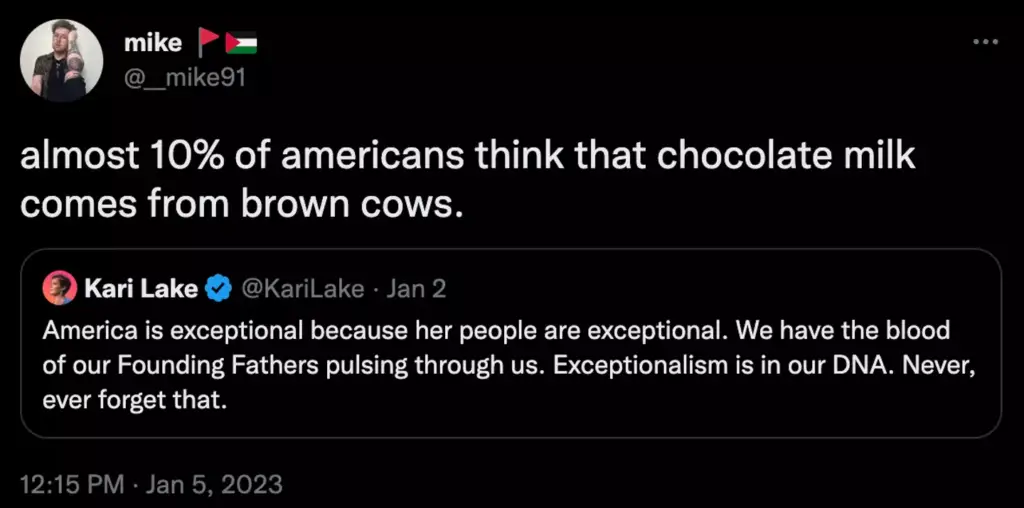There are many misconceptions we grow out of as we get older. As children, we might have believed in Santa Claus, the Easter Bunny, or the Tooth Fairy. These myths, though, are harmless parts of childhood that we eventually learn to laugh off. But what happens when certain myths persist into adulthood? A recent survey has revealed a shocking truth about American adults: a significant number believe that chocolate milk comes directly from brown cows. Yes, you read that right. It’s the kind of revelation that makes you question the collective knowledge of society and wonder how such a basic fact could be so misunderstood.
The Surprising Survey Results

The Innovation Center of U.S. Dairy, in collaboration with Edelman Intelligence, conducted a survey to understand Americans’ perceptions of dairy products. The survey, which polled 1,000 adults from across all 50 states, yielded some startling results. According to the findings, seven percent of respondents believe chocolate milk comes from brown cows. While seven percent might not sound like a large number, it translates to around 16.4 million Americans. To put this in perspective, that’s roughly equivalent to the population of entire countries like Cambodia or Chad. In the U.S., it’s about double the population of New York City. It’s a statistic that leaves many shaking their heads in disbelief and wondering about the state of public education, according to LADBible.
A Broader Issue of Food Ignorance
Sadly, the misunderstanding about chocolate milk is not an isolated case. Misinformation about where food comes from is widespread. Back in 1993, a study by the Department of Agriculture found that nearly 20% of adults did not realize that beef is the primary ingredient in hamburgers. Similarly, a more recent study focusing on elementary school students revealed that four out of ten didn’t know cows are used to make hamburgers, and three in ten didn’t realize milk is used to make cheese. These findings highlight a gap in basic food education, where both adults and children have significant misconceptions about everyday food items. If people are unsure about these basics, one can only imagine the misconceptions that exist around more complex topics related to food and nutrition.

The Role of Education in Correcting Misconceptions
Cecily Upton, co-founder of Food Corps, a nonprofit organization focused on connecting kids to healthy food in schools, addressed this issue in an interview with The Washington Post. Upton explained, “At the end of the day, it’s an exposure issue. Right now, we’re conditioned to think that if you need food, you go to the store. Nothing in our educational framework teaches kids where food comes from before that point.” Upton’s comments underscore a critical gap in the education system. Without a fundamental understanding of where food comes from, people can’t make informed choices. This lack of knowledge perpetuates myths and misunderstandings, like believing chocolate milk comes from brown cows or not knowing that a French fry originates from a potato. Improving food education from a young age could help address these misconceptions and foster a more informed public.

Social Media Reacts

The survey results quickly made their way to social media, where they sparked a mix of disbelief and amusement. Many users expressed their shock that so many adults held such a misconception, while others used humor to cope with the absurdity of the situation. “How is this real life?” one Twitter user asked. Another tweeted, “Next thing you’ll tell me is that strawberry milk comes from pink cows!” The public reaction reveals a broader concern about the state of knowledge and education. Social media has a way of amplifying these concerns, turning what might have been a minor revelation into a widespread discussion about the importance of education and awareness.
Moving Forward: Addressing the Knowledge Gap
While it might be easy to laugh off these misconceptions, they point to a more serious issue about the knowledge gap in society. If adults misunderstand something as basic as the origin of chocolate milk, it begs the question of what other important facts are widely misunderstood. Education plays a vital role in shaping a knowledgeable society, and these findings highlight the need for better educational initiatives around food and nutrition. As Cecily Upton puts it, “Knowledge is power. Without it, we can’t make informed decisions.” Addressing these misconceptions is not just about setting the record straight; it’s about empowering people to make better choices for themselves and their families. Through improved education and awareness, we can hope to see fewer misconceptions and a more informed public in the future.
